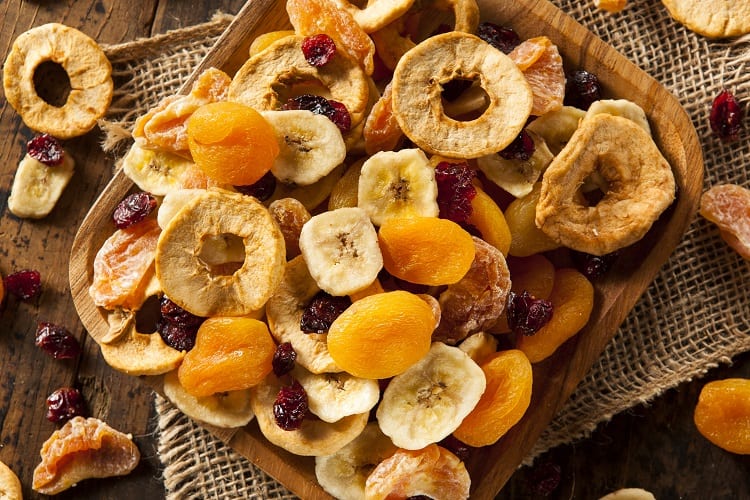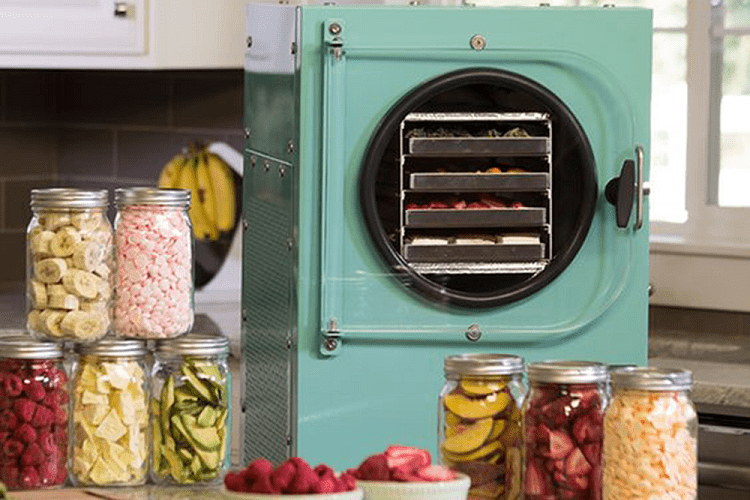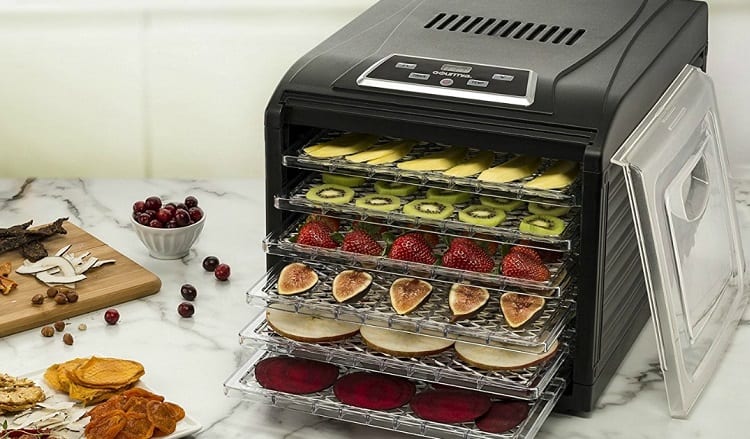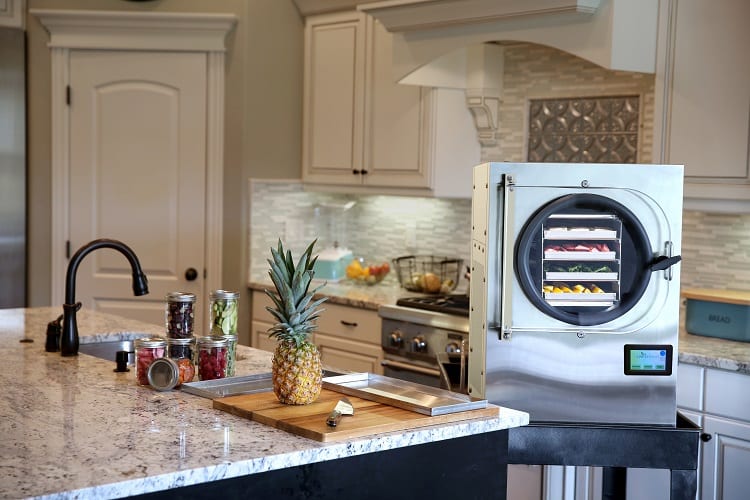You’re preparing for the next natural (or manmade) disaster, and you have your sights set on one of the most important aspects of off-the-grid survival: food.
Dried, brined, frozen and cured, there’s a ton of different ways you can preserve food for the long-haul.
Stuff your doomsday bunkers, line your homestead pantries, but beware – most of the food preservation options available aren’t as powerful as they could be. You could dehydrate and freeze dry your food to keep it for even longer.
We’re here for the showdown: freeze dryer vs dehydrator. Both are effective, both have pros and cons, and both strip the moisture out of food (which is what causes decay and bacterial growth), but which one is better for you?
Let’s find out.
What is the Difference Between a Freeze Dryer vs Dehydrator?
Moisture extraction! A freeze dryer will remove up to 97% of a food’s moisture, more or less, and a dehydrator usually caps off at about 80%.
The freeze-drying process is an entirely different method that requires you to flash freeze your food (or blast chill), and then immediately expose it to a vacuum to withdraw all the water particles from the food.
Dehydrating food requires you to sap the moisture from it through methods like heat drying, air drying, and a vacuum (only without the flash freeze in the beginning).
The difference is that, as we’re about to learn in-depth, freeze dried foods can have a much longer shelf life than dehydrated foods. Most dehydrated foods last about five years (with exceptions), while most freeze dried foods will last for five times longer.
Freeze drying retains flavor, nutritional value, and aroma while dehydrating can remove up to 50% of the nutrition in food, alter the taste, and usually eliminate any scent that the food gives off.
What Makes Food Last Longer?

Both methods allow you to enjoy (or at the very least, consume) goods years after they would have initially expired. While these are both viable options, one of them is clearly better.
Freeze drying your food can make it last from 25 up to 30 years on average, while dehydrating will only last for about 15 up to 25 years, depending on the specific food.
The idea is removing as much moisture as possible, but freeze drying does something different. It removes up to 98% of moisture in most foods, but doesn’t leave you with a tough and horrible product.
When something is freeze dried, a bit of water brings it to life. Dehydrating food, which can take a long time, only removes about 80% of the moisture trapped in food. That means that dehydrated food is still prone to spoiling 18% faster than freeze dried food.
You could think of it on a month-by-month scale. If you want food to last for 100 months, picture each percentage point as a 30-day period. Freeze drying, in this hypothetical scenario, gives you an extra 18 months of food storage.
Advantages and Disadvantages of Freeze Drying

We don’t want to look at freeze drying through rose-colored glasses. It’s important to know all the benefits and drawbacks, so let’s take a look.
Your Own System
Once you own it, it’s yours. Yes, freeze dryers are expensive units, but after the initial cost they don’t really run into a lot of maintenance issues.
We’ll talk more about those later, but suffice to say that you can produce thousands of dollars worth of freeze dried food (up to five figures if you’re smart about it) before even needing a maintenance call on your unit.
Self-Reliance
You’re not relying on those late-night infomercial buckets to sell you tons of freeze dried food.
Those companies have to account for overhead, cost of shipping, you name it. You just have to worry about the food cost and the electricity to run your freeze dryer. Beyond that, it’s not really your problem.
More Moisture Extraction
Freeze dryers take more moisture out of food than dehydrators do, so you end up with longer shelf lives and more food security than you would with just about any other method.
More moisture extraction means you can turn would-be short shelf life foods into disaster-ready, prepper-approved foods in your stockade.
Upfront Cost
These are pricey upfront, and nobody can really dance around the price. Compared to a dehydrator, you could end up paying 400% more for a quality freeze dryer.
Because freeze drying is known to have a longer shelf life, it’s worth the cost, but it’s still a big bullet to bite in the beginning stages.
Not DIY-Friendly
It’s not really a DIY solution. When you have to fix your freeze dryer, nine times out of ten it will require a licensed technician to come out.
You can try it on your own, but it’s not exactly user-friendly once you get the UI off. It sucks, but maintenance calls are in your future if you get a freeze dryer.
Yes, there are some drawbacks, but every food preservation method has them. Let’s take a look at dehydrators and what they offer.
Advantages and Disadvantages of Dehydrator

While dehydrators may not be the best bet for everyone, they do have some benefits that are pretty hard to ignore.
Long Shelf Life
While this guide between dehydration and freeze drying does have a favored spin on freeze drying, dehydrators still have their place in your prepping plans.
They can dehydrate food exceptionally well, and if you’re smart about how you use it, you can even make your own edible jerky in a dehydrator. The bottom line is that food will last longer when you dehydrate it the right way.
Lowers Food Weight
When you designate a bug out bag, every ounce matters. You’ll hear me say that six ways ‘til Sunday. Dehydrated food has a lower weight than non-dehydrated food.
Apart from lasting longer, it’s also less weight on your back, and doesn’t drag you down like traditional food does. You have to hit that peak 70-80% moisture pull before this benefit makes itself known.
Batch Drying
Does it feel like the end of the world is going to be at the end of the week?
Dehydrators work fast, so you can prepare food now and use it as soon as you see fit.
Freeze drying can take quite a while to complete, but with dehydrating time is surely on your side. Keep in mind that if you speed run through this and dry your food improperly, it’s going to have a taste and texture difference.
Costs Less Than a Freeze Dryer
You can’t avoid it – dehydrating food is more cost-effective than freeze drying it. Whether or not it’s better depends on your own subjective opinions about this little duel we’ve had going on, but if you want to save money, dehydrating is the way to go.
For the most part, you can also dehydrate food faster than you can freeze dry it, so you’re running your machine for less time on top of it.
You Can Ruin Food
Not a bonus, but if you don’t use this system properly, you can seriously dehydrate the heck out of your food to the point that it’s not edible.
Dehydrated food isn’t anyone’s first choice, but when done properly, you hit that sweet spot being being edible and delicious, and still extending the shelf life by months at a time. Dehydrated food can be pretty tasty when you get the hang of how to use your new dehydrator.
Dehydrators have their own sets of pluses and minuses, but they’re still excellent ideas if you can’t afford a freeze dryer, or you like the idea of dehydrated foods better.
Can You Buy a Freeze Dryer for Your Home?

A freeze dryer isn’t some countertop appliance that you get – it’s a major purchase, and it’s one that you can definitely make for your home. It’s not exclusive to commercial use or the food industry.
One of the best freeze dryers on the market is this medium-sized freeze dryer unit from HarvestRight. In fact, if you want to freeze dry food at home, HarvestRight is basically the only option you have. A quick search will show you that they basically have a corner on the market.
Buying a freeze dryer for your home isn’t exactly going to be cheap. For the initial cost and how much they require to operate, you’re looking at a big upfront expense. Depending on how much use you get out of this, you could also end up with about $120-$150 per year in increased utility bills.
At the end of the day, just about anyone on this site would gladly take a slightly higher utility bill to have well-preserved food for a disaster, it’s still just something to think about.
Are Home Dehydrators Expensive?
Not really. This category definitely has the “You get what you pay for motto” attached to it. There are inexpensive and small racks for under a hundred bucks, but then there are models that run you north of five-hundred dollars and offer more utility per use.
Basically, you can go with a smaller unit and risk it not doing as good of a job while having a lower output, or opt for something more high-end that will not only do a great job, but also batch dry enough food for a month straight (and then some).
The Best Way to Preserve Food is Up to You
Which method will you choose?
Dehydrating and freeze drying have their differences, and you can use both options for different types of foods to get the best results.
At the end of the day, it’s all about preserving food, so if you’re comfortable with utilizing both options, that’s great – you just need food storage that’s going to last through a disaster.


[lasso rel="emergency-preparedness-more-a-manual-on-food-storage-and-survival-2nd-edition-revised-and-updated" id="35334"]